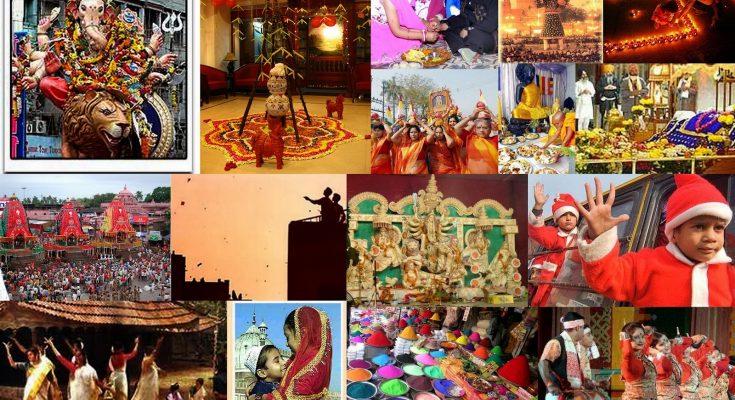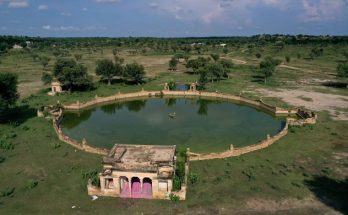Table of Contents
Festivals of India Essay -1379 words
Festivals are like glue that binds the society together. They help us to build relationships and create memories that last a lifetime.
Imagine a land where every day feels like a Festival, where vibrant colors, vibrant music and mouth-watering foods fill the air. Welcome to India, the land of Festivals! From the snow-capped mountains in the north to the tropical beaches in the south, India celebrates a plethora of Festivals throughout the year. Whether it is a national event that unites the whole country or a religious ritual that brings communities together, the Festivals in India are a feast for the eyes. In this essay, we introduce you to the three main types of Festivals that make India a true feast for the senses: national, religious and seasonal. So buckle up and get ready to experience the magic of Indian Festivals!
The Importance of Festivals
Festivals in India are more than just an excuse to take a break from routine and indulge in merriment. They are an important part of India’s rich cultural heritage, bringing people of all ages and backgrounds together and promoting harmony and social cohesion. Whether it is the joy of sharing sweets and greetings with neighbours on Diwali, the exuberance of dancing to the beat of dhols on Holi, or the solemnity of offering prayers on Eid, Festivals in India are powerful reminders of our common humanity.
But that’s not all! Festivals in India also provide a unique platform to showcase the country’s diverse and vibrant art, craft and culinary traditions. From ornate rangolis to beautiful handicrafts, from the tantalising aroma of biryani to the spicy taste of jalebis, India’s Festivals are a feast for the senses. And with tourism being a major driver of India’s economy, Festivals also provide a lucrative opportunity to attract visitors from all over the world and showcase India’s hospitality and warmth.
National Festivals
National Festivals are the backbone of our country’s identity, they remind us of our shared heritage and values.
When it comes to national Festivals, India has a rich and storied history. These are the days when the entire country comes together to celebrate its sovereignty, its people and its rich cultural heritage. From the breathtaking spectacle of the Republic Day parade to the rousing speeches on Independence Day, these Festivals are an opportunity to reflect on India’s journey and take pride in its achievements.
One of the most famous national Festivals in India is Independence Day, which is celebrated every year on 15 August. This is the day India gained its independence from British rule in 1947, and it is a time to honour the sacrifices of the freedom fighters who made this possible. All over the country, people hoist the national flag, sing the national anthem and take part in parades and cultural programmes.
Another important national Festival is Republic Day, which is celebrated every year on 26 January. On this day, the Indian Constitution came into force in 1950, marking the country’s transition from a British colony to a sovereign republic. The highlight of Republic Day is the grand parade in New Delhi, where armed forces, school children and cultural groups showcase their skills and talents.
And of course, we must not forget Gandhi Jayanti, which is celebrated every year on 2 October. On this day, India honours Mahatma Gandhi, the father of the nation who led India’s non-violent struggle for independence. Across the country, people say prayers, sing hymns and take part in purges to honour his legacy.
Religious Festivals
Religious Festivals are the heart and soul of our culture, they celebrate our faith, traditions, and spirituality
When it comes to religious Festivals in India, the list is endless! From the twinkling lights of the Diwali Festival to the colourful chaos of the Holi Festival, India is a land of diverse beliefs and practises, and its Festivals reflect this in all their glory.
One of the most celebrated religious Festivals in India is Diwali, also known as the Festival of Lights. This Festival celebrates the victory of good over evil and the return of Lord Rama to his kingdom after 14 years of exile. People light diyas and candles, decorate their houses with rangolis and burst firecrackers to celebrate this joyous occasion.
Another popular Festival is Holi, the Festival of colours. This Festival is celebrated in honour of Lord Krishna, who loved to play with colours. People throw coloured powder and water at each other, dance to the sounds of dhol and enjoy delicious sweets and snacks.
Then there is Dussehra, which celebrates the triumph of Lord Rama over the demon king Ravana. All over India, people celebrate this Festival by burning effigies of Ravana, eating festive food and participating in cultural programmes.
For the Muslim community in India, Eid is one of the most important Festivals. It marks the end of the holy month of Ramadan and is a time for prayers, exchanging gifts and sharing meals with family and friends.
And do not forget Christmas, celebrated by the Christian community in India. This Festival commemorates the birth of Jesus Christ and is a time for prayers, singing Christmas carols and spreading joy and goodwill.
Finally, there is Guru Nanak Jayanti, a Festival celebrating the birth anniversary of Guru Nanak, the founder of Sikhism. People say prayers, sing hymns and do community service to honour his teachings of equality and compassion.
Seasonal Festivals
Seasonal Festivals are celebrations of nature and agriculture, reminding us of our connection to the land and the environment.
India is a land of many seasons, and with each season there is a new Festival to celebrate! These seasonal Festivals pay homage to the lush nature that nourishes us and the hard work of our farmers who toil in the fields.
One of the most important seasonal Festivals is Makar Sankranti, celebrated in January when the sun moves into the northern hemisphere. People fly colourful kites, prepare sweet delicacies from sesame seeds and take holy baths in rivers to celebrate this auspicious day.
In the southern state of Tamil Nadu, Pongal is celebrated to thank the sun god for a bountiful harvest. People prepare a sweet rice pudding called Pongal, decorate their houses with colourful kolams and indulge in traditional sports like bull racing and jallikattu.
And then there is Onam, a harvest Festival celebrated in the southern state of Kerala. People prepare a big feast called Onam Sadhya, wear new clothes and take part in cultural programmes like snake boat races and Pulikali, where people paint themselves like tigers and dance to the beat of drums.
For the people of Assam, Bihu is a Festival that marks the beginning of spring and the start of the agricultural cycle. People perform the Bihu dance, prepare special dishes like pitha and larus, and light bonfires to drive away evil spirits.
Festivals are a time to put aside our differences and come together in celebration of our shared humanity.
By the end of this journey through the Festivals of India, one thing is clear: India is a country that loves to celebrate! From national Festivals that instil a sense of pride and patriotism, to religious Festivals that connect us to our faith and traditions, to seasonal Festivals that celebrate the beauty of nature, India has a Festival for every occasion and mood.
But Festivals are more than just colourful decorations, delicious food and lively music. They bring people together, promote harmony and strengthen cultural and social bonds. Festivals are a time when we forget our differences and come together as one big family.
Festivals also provide an opportunity to showcase traditional arts, crafts and cuisine and boost tourism. They offer a glimpse of India’s rich cultural heritage and invite people from all over the world to experience the warmth and hospitality of the country.
So let us embrace the spirit of the Festivals and celebrate the diversity that makes India unique. Let us learn from the lessons of our Festivals – to be grateful for what we have, to care for our environment and to be compassionate towards others. As we continue to celebrate our Festivals with enthusiasm and joy, let us remember that the true spirit of India lies in its people, its traditions and its Festivals. Happy Festivals to all!
Festivals of India Essay – 150 -200 words
India is a land of festivals that bind society together and promote harmony and social cohesion. Festivals are more than just an excuse to take a break from routine and indulge in merriment. They are an important part of India’s rich cultural heritage, bringing together people of all ages and backgrounds. From the snow-capped mountains in the north to the tropical beaches in the south, India celebrates a plethora of festivals throughout the year. There are three main types of festivals in India, namely national, religious and seasonal. National festivals are the backbone of the country’s identity and remind us of our common heritage and values. Religious festivals are the heart and soul of our culture and celebrate faith, traditions and spirituality. Seasonal festivals are celebrations of nature and agriculture and remind us of our connection to the land and the environment. Festivals also provide a unique platform to showcase the diverse and vibrant art, craft and culinary traditions of the country. With tourism being a major driver of India’s economy, festivals provide a lucrative opportunity to attract visitors from all over the world and showcase India’s hospitality and warmth.
Festivals of India essay 250 -300 words
India is known for its colourful festivals which are celebrated with great enthusiasm and joy throughout the year. These festivals play an important role in keeping society together and promoting social cohesion. They provide a unique platform to showcase India’s diverse cultural heritage and culinary traditions.
National festivals are an integral part of India’s identity and celebrate the country’s sovereignty, people and cultural heritage. Independence Day, Republic Day and Gandhi Jayanti are some of the most famous national festivals celebrated with great grandeur across the country. These festivals provide an opportunity to reflect on India’s journey and take pride in its achievements.
Religious festivals are the heart and soul of Indian culture, celebrating the country’s diverse beliefs and practises. Diwali, Holi, Dussehra, Eid, Christmas and Guru Nanak Jayanti are some of the most celebrated religious festivals in India. These festivals celebrate faith, traditions and spirituality and are a time for prayers, exchanging gifts and sharing food with family and friends.
Seasonal festivals are celebrations of nature and agriculture, a tribute to the land and the environment. They remind us of our connection with nature and the importance of preserving it for future generations. Some of the most popular seasonal festivals in India are Makar Sankranti, Bihu, Onam and Pongal.
Festivals in India are not just an excuse to take a break from routine and indulge in merriment. They are an important part of India’s cultural heritage and promote harmony and social cohesion. They provide an opportunity to showcase India’s diverse cultural traditions and attract visitors from all over the world who contribute to the country’s economy.
In summary, festivals in India are a true feast for the senses and celebrate the country’s rich cultural heritage, faith, traditions and spirituality. They play an important role in promoting social cohesion and provide a platform to showcase India’s diverse cultural and culinary traditions.



